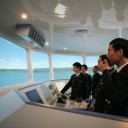Article 8
1. The rate to be used for determining the equivalent in other currency of the minimum basic pay or wages prescribed in Article 5 shall be the ratio between the par value of that currency and the par value of the pound of the United Kingdom of Great Britain and Northern Ireland or of the dollar of the United States of America.
2. In the case of the currency of a Member of the International Labour Organization which is a Member of the International Monetary Fund the par value shall be that currently in effect under the Articles of Agreement of the International Monetary Fund.
3. In the case of the currency of a Member of the International Labour Organization which is not a Member of the International Monetary Fund, the par value shall be the official rate of exchange, in terms of gold or of the dollar of the United States of America of the weight and fineness in effect on 1 July 1944, currently in effect for payments and transfers for current international transactions.
4. In the case of any currency which cannot be dealt with under the provisions of either of the two preceding paragraphs--
(a) the rate to be adopted for the purpose of this Article shall be determined by the Member of the International Labour Organization concerned;
(b) the Member concerned shall notify its decision to the Director-General of the International Labour Office, who shall forthwith inform the other Members which have ratified this Convention;
(c) within a period of six months from the date on which the information is communicated by the Director-General, any other Member which has ratified the Convention may inform the Director-General of the International Labour Office that it objects to the decision, and the Director-General shall thereupon inform the Member concerned and the other Members which have ratified the Convention and shall report the matter to the Committee provided for in Article 21;
(d) the foregoing provisions shall apply in the event of any change in the decision of the Member concerned.
5. A change in basic pay or wages as a result of a change in the rate for determining the equivalent in other currency shall take effect not later than the beginning of the second calendar month following that in which the change in the relative par values of the currencies concerned becomes effective.
Article 9
Each Member shall take the necessary measures--
(a) to ensure, by way of a system of supervision and sanctions, that remuneration is paid at not less than the rate required by this Convention; and
(b) to ensure that any person who has been paid at a rate less than that required by this Convention is enabled to recover, by an inexpensive and expeditious judicial or other procedure, the amount by which he has been underpaid.
PART III. HOURS OF WORK ON BOARD SHIP
Article 10
This Part of this Convention does not apply to--
(a) a chief officer or chief engineer;
(b) a purser;
(c) any other officer in charge of a department who does not keep watch;
(d) a person employed in the clerical or catering department of a vessel who is--
(i) serving in a superior grade as defined by a collective agreement between the organizations of shipowners and seafarers concerned; or
(ii) working chiefly on his own account; or
(iii) remunerated solely on a commission basis or chiefly by a share of profits or earnings.
Article 11
In this Part of this Convention--
(a) the term "near trade ship" means a vessel exclusively engaged in voyages upon which it does not proceed farther from the country from which it trades than the near-by ports of neighbouring countries within geographical limits which--
(i) are clearly specified by national laws, regulations or by collective agreement between organizations of shipowners and seafarers;
(ii) are uniform in respect of the application of all the provisions of this Part of the Convention;
(iii) have been notified by the Member when registering its ratification by a declaration annexed thereto; and
(iv) have been fixed after consultation with the other Members concerned;
(b) the term "distant trade ship" means a vessel other than a near trade ship;
(c) the term "passenger ship" means a vessel licensed to carry more than twelve passengers;
(d) the term "hours of work" means time during which a person is required by the orders of a superior to do work on account of the vessel or the owner.
Article 12
1. This Article applies to officers and ratings employed in the deck, engine-room and radio departments of near trade ships.
2. The normal hours of work of an officer or rating shall not exceed--
(a) when the vessel is at sea, twenty-four hours in any period of two consecutive days;
(b) when the vessel is in port--
(i) on the weekly day of rest, such time not exceeding two hours as is necessary for ordinary routine and sanitary duties;
(ii) on other days, eight hours except where a collective agreement provides for less on any day;
(c) one hundred and twelve hours in a period of two consecutive weeks.
3. Time worked in excess of the limits prescribed in subparagraphs (a) and (b) of paragraph 2 shall be regarded as overtime for which the officer or rating concerned shall be entitled to compensation in accordance with the provisions of Article 17 of this Convention.
4. When the total number of hours worked in a period of two consecutive weeks, excluding hours regarded as overtime, exceeds one hundred and twelve, the officer or rating concerned shall be compensated by time off in port or otherwise as may be determined by collective agreement between the organizations of shipowners and seafarers concerned.
5. National laws or regulations or collective agreements shall determine when a ship is to be regarded as being at sea and when it is to be regarded as being in port for the purposes of this Article.
Article 13
1. This Article applies to officers and ratings employed in the deck, engine-room and radio departments of distant trade ships.
2. When the vessel is at sea and on days of sailing and arrival, the normal hours of work of an officer or rating shall not exceed eight hours in any one day.
3. When the vessel is in port, the normal hours of work of an officer or rating shall not exceed--
(a) on the weekly day of rest, such time not exceeding two hours as is necessary for ordinary routine and sanitary duties;
(b) on other days, eight hours except where a collective agreement provides for less on any day.
4. Time worked in excess of the daily limits prescribed in the preceding paragraphs shall be regarded as overtime for which the officer or rating shall be entitled to compensation in accordance with the provisions of Article 17 of this Convention.
5. When the total number of hours worked in a period of one week, excluding hours regarded as overtime, exceeds forty-eight, the officer or rating shall be compensated by time off in port or otherwise as may be determined by collective agreement between the organizations of shipowners and seafarers concerned.
6. National laws or regulations or collective agreements shall determine when a ship is to be regarded as being at sea and when it is to be regarded as being in port for the purposes of this Article.
1. The rate to be used for determining the equivalent in other currency of the minimum basic pay or wages prescribed in Article 5 shall be the ratio between the par value of that currency and the par value of the pound of the United Kingdom of Great Britain and Northern Ireland or of the dollar of the United States of America.
2. In the case of the currency of a Member of the International Labour Organization which is a Member of the International Monetary Fund the par value shall be that currently in effect under the Articles of Agreement of the International Monetary Fund.
3. In the case of the currency of a Member of the International Labour Organization which is not a Member of the International Monetary Fund, the par value shall be the official rate of exchange, in terms of gold or of the dollar of the United States of America of the weight and fineness in effect on 1 July 1944, currently in effect for payments and transfers for current international transactions.
4. In the case of any currency which cannot be dealt with under the provisions of either of the two preceding paragraphs--
(a) the rate to be adopted for the purpose of this Article shall be determined by the Member of the International Labour Organization concerned;
(b) the Member concerned shall notify its decision to the Director-General of the International Labour Office, who shall forthwith inform the other Members which have ratified this Convention;
(c) within a period of six months from the date on which the information is communicated by the Director-General, any other Member which has ratified the Convention may inform the Director-General of the International Labour Office that it objects to the decision, and the Director-General shall thereupon inform the Member concerned and the other Members which have ratified the Convention and shall report the matter to the Committee provided for in Article 21;
(d) the foregoing provisions shall apply in the event of any change in the decision of the Member concerned.
5. A change in basic pay or wages as a result of a change in the rate for determining the equivalent in other currency shall take effect not later than the beginning of the second calendar month following that in which the change in the relative par values of the currencies concerned becomes effective.
Article 9
Each Member shall take the necessary measures--
(a) to ensure, by way of a system of supervision and sanctions, that remuneration is paid at not less than the rate required by this Convention; and
(b) to ensure that any person who has been paid at a rate less than that required by this Convention is enabled to recover, by an inexpensive and expeditious judicial or other procedure, the amount by which he has been underpaid.
PART III. HOURS OF WORK ON BOARD SHIP
Article 10
This Part of this Convention does not apply to--
(a) a chief officer or chief engineer;
(b) a purser;
(c) any other officer in charge of a department who does not keep watch;
(d) a person employed in the clerical or catering department of a vessel who is--
(i) serving in a superior grade as defined by a collective agreement between the organizations of shipowners and seafarers concerned; or
(ii) working chiefly on his own account; or
(iii) remunerated solely on a commission basis or chiefly by a share of profits or earnings.
Article 11
In this Part of this Convention--
(a) the term "near trade ship" means a vessel exclusively engaged in voyages upon which it does not proceed farther from the country from which it trades than the near-by ports of neighbouring countries within geographical limits which--
(i) are clearly specified by national laws, regulations or by collective agreement between organizations of shipowners and seafarers;
(ii) are uniform in respect of the application of all the provisions of this Part of the Convention;
(iii) have been notified by the Member when registering its ratification by a declaration annexed thereto; and
(iv) have been fixed after consultation with the other Members concerned;
(b) the term "distant trade ship" means a vessel other than a near trade ship;
(c) the term "passenger ship" means a vessel licensed to carry more than twelve passengers;
(d) the term "hours of work" means time during which a person is required by the orders of a superior to do work on account of the vessel or the owner.
Article 12
1. This Article applies to officers and ratings employed in the deck, engine-room and radio departments of near trade ships.
2. The normal hours of work of an officer or rating shall not exceed--
(a) when the vessel is at sea, twenty-four hours in any period of two consecutive days;
(b) when the vessel is in port--
(i) on the weekly day of rest, such time not exceeding two hours as is necessary for ordinary routine and sanitary duties;
(ii) on other days, eight hours except where a collective agreement provides for less on any day;
(c) one hundred and twelve hours in a period of two consecutive weeks.
3. Time worked in excess of the limits prescribed in subparagraphs (a) and (b) of paragraph 2 shall be regarded as overtime for which the officer or rating concerned shall be entitled to compensation in accordance with the provisions of Article 17 of this Convention.
4. When the total number of hours worked in a period of two consecutive weeks, excluding hours regarded as overtime, exceeds one hundred and twelve, the officer or rating concerned shall be compensated by time off in port or otherwise as may be determined by collective agreement between the organizations of shipowners and seafarers concerned.
5. National laws or regulations or collective agreements shall determine when a ship is to be regarded as being at sea and when it is to be regarded as being in port for the purposes of this Article.
Article 13
1. This Article applies to officers and ratings employed in the deck, engine-room and radio departments of distant trade ships.
2. When the vessel is at sea and on days of sailing and arrival, the normal hours of work of an officer or rating shall not exceed eight hours in any one day.
3. When the vessel is in port, the normal hours of work of an officer or rating shall not exceed--
(a) on the weekly day of rest, such time not exceeding two hours as is necessary for ordinary routine and sanitary duties;
(b) on other days, eight hours except where a collective agreement provides for less on any day.
4. Time worked in excess of the daily limits prescribed in the preceding paragraphs shall be regarded as overtime for which the officer or rating shall be entitled to compensation in accordance with the provisions of Article 17 of this Convention.
5. When the total number of hours worked in a period of one week, excluding hours regarded as overtime, exceeds forty-eight, the officer or rating shall be compensated by time off in port or otherwise as may be determined by collective agreement between the organizations of shipowners and seafarers concerned.
6. National laws or regulations or collective agreements shall determine when a ship is to be regarded as being at sea and when it is to be regarded as being in port for the purposes of this Article.
请登录后发帖

 联系我们人工客服
联系我们人工客服



















 :1391995811
:1391995811

